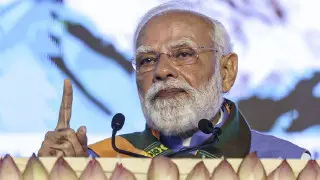
Prime Minister Narendra Modi will chair the first meeting on Wednesday under the Chief Election Commissioner and Other Election Commissioners (Appointment, Conditions of Service and Term of Office) Act, 2023 to select a new election commissioner (EC). This comes as current EC Anup Chandra Pandey is set to retire on 15 February.
The new act, which came into effect on 2 January, states that the President will appoint the CEC and ECs based on the recommendation of a Selection Committee. This committee consists of the Prime Minister, a Cabinet minister, and the leader of the Opposition or leader of the largest opposition party in the Lok Sabha.
Government officials aware of the matter said law minister Arjun Ram Meghwal and Congress's parliamentary party leader Adhir Ranjan Chowdhury were expected to attend the 7:30 pm meeting at the PM's residential office.
The selection process involves two committees - the three-member selection committee headed by the PM and a three-member search committee chaired by the law minister with two secretary-level officers. Although the search committee recommends five names to the selection committee, the latter can pick commissioners from outside the list as well.
Previously, the CEC and ECs were appointed by the Prime Minister and the council of ministers under the seal of the President. In March last year, the Supreme Court called for a law on how CECs and ECs should be selected, saying no mechanism existed at the time. It formed a three-member panel of the PM, opposition leader and Chief Justice of India (CJI).
However, the new law replaced the CJI with a Cabinet minister, effectively giving the government a 2-1 majority. During the Rajya Sabha passage of the bill on 12 December, the opposition staged a walkout before the voice vote, alleging its provisions were "undemocratic". The government maintained the bill aligned with the Supreme Court's directions.













Copyright © 2025 Top Indian News
